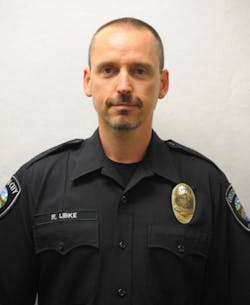Report: Oregon Police Forced to Leave Officer Behind
When the call went out that an officer had been shot, police swarmed to the street where Oregon City Reserve Officer Robert Libke lay bloodied and motionless.
By all accounts, Libke appeared to be dead.
The shooter, 88-year-old Lawrence Cambra, initially thought to be armed with a rifle, was at large, and his house was in flames.
While officers monitored Libke for signs of life, they evacuated neighbors, established a perimeter and searched for the gunman. They had no way to know that Libke was alive though mortally wounded.
An investigative report that detailed events surrounding deaths of Libke and Cambra, who committed suicide when confronted by a SWAT team, was released Monday.
The report chronicles the difficult decisions faced by Libke's fellow officers, who balanced their urge to reach him with the knowledge they could be walking into ambush.
The officers followed protocol and responded appropriately, said Oregon City Police Chief Jim Band during an hour-long news conference.
Band said Officer Sean Ellis and Libke arrived in the same car. Officer Jared Turpin was on the scene seconds later. Turpin and Ellis went to interview two men standing at the end of Cambra's driveway, while Libke went down Eastfield Drive, a narrow street that paralleled the driveway.
Turpin and Ellis heard what sounded like a gunshot. As they cautiously turned the corner they saw Libke down and bleeding.
Band recounted their conversation.
"We need to get Rob," Ellis said.
"No, we don't, we need to get out of here," Turpin said.
Turpin, a SWAT team member, knew too well what could happen. During a recent training exercise he had gone to assist a downed officer and was "killed" in a mock ambush.
Given the apparent accuracy of the shooter and Libke's wound, Turpin and Ellis concluded that the armed gunman had a rifle. If that was the case, the gunman could effectively zero in on distant targets. And initially, no one knew his whereabouts.
"We have to minimize the loss of life," Band said. "Do I go out there and grab what appears to be a dead guy and risk my own life?"
Libke was shot approximately one minute and 12 seconds after he left his patrol car.
Oregon City police showed reporters a video of the shooting taken by a neighbor.
He briefly is off camera then walks down Eastfield. He sees Cambra inside the door of a neighbor's unfinished garage.
Libke peers over the top of a backyard fence then backs away. Gun drawn, Libke apparently orders Cambra to drop his weapon. Instead, Cambra, who is not visible on the video, fires one shot from about 40 feet. Libke bends over, then falls to the ground.
The video was not released because of its graphic content, said spokesman Sgt. Matt Paschall.
Libke showed no signs of life until SWAT teams arrived nearly 90 minutes after he was shot.
"Everyone was operating on the assumption he was deceased," Band said.
One of the armored SWAT vehicles pulled up next to Libke and behind the garage where Cambra was holed up. SWAT members said they saw Libke move his head and an arm.
He was rushed to an ambulance and within a few minutes was on the way to Legacy Emanual Medical Center via helicopter. He died at the hospital the following day.
There was nothing that could be done to save Libke, said Dr. Seth Izenberg, a trauma surgeon who accompanied the SWAT teams that responded to the call.
"There was no difference made by that 90-minute delay," Izenberg said.
Police chief talks about report on Oregon City officer shooting The Oregon City Police released a detailed report on the shooting last fall of Reserve Officer Robert Libke by 88-yr-old Lawrence Cambra. Following a press briefing on the report, Police Chief Jim Band talked about the after-effects.
The power of the hollow-point bullet was amplified as it passed through a fence and started to expand before striking Libke, Izenberg said.
The initial assessment that Libke was dead seemed reasonable, given his blood loss and the } -inch entry wound in his forehead, Izenberg said.
"I don't think he felt any pain," the doctor said.
As one SWAT team rushed to recover Libke, another pulled up in front of the garage where Cambra, dressed in a t-shirt and pajamas, had taken refuge.
Two sharpshooters fired at Cambra, hitting him in the left hip and right shoulder, as Cambra fired a fatal bullet into his heart.
He used the same gun, a .38-caliber revolver with a 2-inch barrel, that he used to kill Libke.
Band lost one of his men, but he said his officers handled a dangerous and complex situation with professional precision.
And Cambra had no opportunity to kill anyone else.
"Some days that's as good as it gets," Band said.
Copyright 2014 - The Oregonian, Portland, Ore.
McClatchy-Tribune News Service
